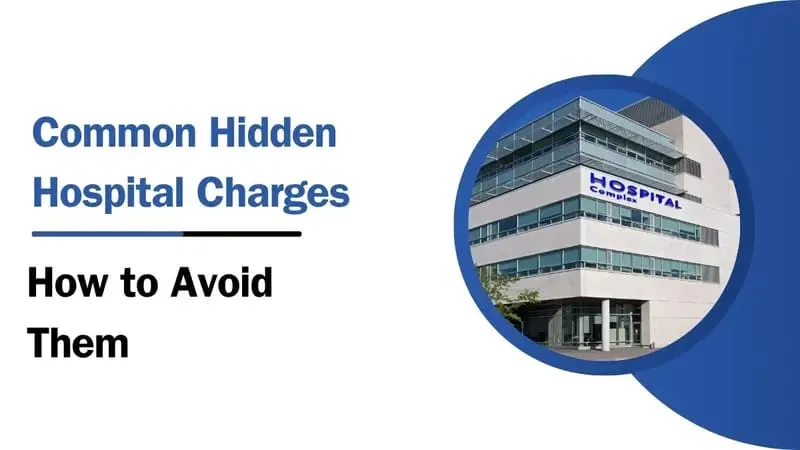When people think about hospital bills, they often focus on the big numbers—like surgery fees, room charges, or medication costs. However, the reality is far more complex. Many patients end up feeling overwhelmed not by the major expenses, but by the hidden hospital charges that quietly slip into the bill. These costs are rarely explained upfront and may include services or items patients didn’t even realize they were using. Understanding these hidden costs and learning how to avoid them can save patients a significant amount of money while reducing unnecessary stress.
The Mystery of Room and Facility Fees
One of the most common hidden charges in hospitals comes in the form of facility fees. These are extra charges added simply because a patient received care inside a hospital rather than at a clinic or private office. A single consultation can cost hundreds of dollars more with these fees attached. Similarly, patients may find room charges escalating due to subtle add-ons for “special care,” cleaning, or prolonged stays, even if they didn’t request the extras.
To avoid this, patients should ask for a breakdown of accommodation-related charges before being admitted. Requesting a standard room instead of a private one, or asking if certain facility fees can be waived, can significantly reduce unnecessary costs. Always double-check for duplicate or extended stay bills added without consent.
Diagnostic and Lab Test Markups
Hospitals often recommend a variety of diagnostic tests, from blood work to imaging scans. While these are important for medical care, many hospitals apply steep markups on lab tests, sometimes charging much more than an independent diagnostic center would. For example, a simple blood test costing a few hundred rupees outside may be billed at several times that amount in a hospital setting.
Patients can take control by requesting detailed test explanations before agreeing to them. If the test is routine and non-emergency, ask whether it can be done at an outside accredited lab. Comparing prices helps patients make informed decisions and avoid unnecessary markups.
Medication Overpricing in Hospitals
Another major area of concern is the medication charges on hospital bills. Hospitals often stock their own pharmacies, and while it’s convenient for patients, the prescribed drugs are usually billed at a premium price. In some cases, patients are charged for entire packs of medicines even when they use only a few tablets during their stay.
To counter this, patients have the right to buy prescribed medicines from outside pharmacies, often at a more reasonable cost. Always ask for the original prescriptions and insist on using only the required quantity of medication instead of paying for entire unopened packs. This small step can save thousands over the course of treatment.
The Price of Medical Supplies
Bandages, gloves, syringes, and even simple medical supplies are often billed at astonishingly high rates in hospital invoices. These items, which may cost very little in retail stores, are marked up multiple times in the final bill. In some cases, patients may even be billed for items that were never used.
The key here is scrutinizing the supply charges on the bill. Patients should request receipts and itemized details for every supply used. If something looks unfamiliar or unnecessarily repeated, it’s important to challenge the charge immediately. Hospitals sometimes remove these fees when questioned.
Specialist Consultation Fees
Patients often see multiple doctors or specialists during a hospital stay, each of whom may add a separate consultation fee. These charges can accumulate quickly, especially in large hospitals where multidisciplinary care is common. Sometimes, patients are billed for a consultation even if they barely interacted with the doctor.
To avoid these hidden costs, patients should clarify upfront about which consultations are essential and whether repeated visits are necessary. Families should keep track of each doctor’s visit and verify that the charges match the actual consultations received.
Unnecessary Procedures and Add-On Services
Hospital bills also contain charges for add-on services that may not have been strictly needed for the treatment plan. Examples include advanced monitoring devices, physiotherapy sessions, or wellness programs introduced without clear patient consent. In high-pressure hospital environments, patients may not realize they are being signed up for these extras until the bill arrives.
A good strategy is to question every procedure suggested, particularly if it sounds optional or unrelated to the main condition. Patients and caregivers must feel comfortable asking doctors, “Is this necessary?” or “Can this be done outside the hospital?” Avoiding unnecessary add-ons is one of the best ways to control costs.
How to Protect Yourself from Hidden Charges
Awareness is the strongest tool in fighting hidden hospital costs. Here are some practical steps patients can take:
- Request a pre-admission estimate that includes possible add-ons.
- Ask for itemized bills instead of lump-sum invoices.
- Use your medical insurance wisely and verify which charges are covered.
- Keep records of all communication with doctors, staff, and billing departments.
- Challenge unclear invoices immediately; many hospitals remove unjustified fees when questioned.
Being proactive can make a significant financial difference and help patients avoid feeling trapped by confusing hospital billing practices.
Final Words
Hospital visits are stressful enough without the added frustration of discovering hidden hospital charges buried in medical bills. By staying vigilant, asking the right questions, and demanding transparency, patients can protect themselves from unnecessary costs. Healthcare should focus on healing, not on hidden surprises that increase financial pressure. Patients and families deserve clarity, fairness, and honesty in every stage of medical care.
Disclaimer: The above article is for informational purposes only and is not a substitute for professional medical or financial advice. Patients should consult healthcare and insurance professionals for personalized guidance.



